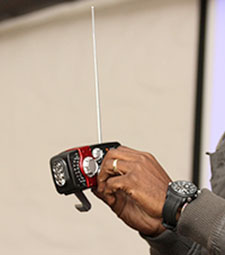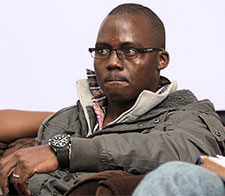With Zimbabwe elections days away, the fight over access to the airwaves has intensified. The media environment has loosened slightly compared with previous years, but most Zimbabweans still lack access to independent sources of news, including radio. One person familiar with obstacles to broadcasting is Zenzele Ndebele, editor of Radio Dialogue, a community radio station based in Bulawayo, Zimbabwe, founded in 2001.
The government does not license community radio broadcasters, so Radio Dialogue distributes its content on compact discs and flash drives. In March, Ndebele was arrested for distributing shortwave, solar-powered, hand-crank radios. He spoke to CPJ in Johannesburg this month about the vital role of radio in Zimbabwe and what he sees as the shortcomings of development journalism, where journalists focus on social and economic development at the expense of reporting on political accountability and democratic weaknesses. The interview has been edited for length.
Sue Valentine: What motivated the distribution of solar-powered, hand-crank radios?
Zenzele Ndebele: I’ve been working for Radio Dialogue for the past 10 years, trying to get a license, which has not come. Around 2001, people said, “this government is not going to give us a license so let’s rather do programs on shortwave and send them back into the country.” We started working with people outside the country and started distributing radios, legally of course–both shortwave and FM. They were solar powered because Zimbabwe has power cuts, sometime for eight hours a day. You can also use these radios as a torch [flashlight] and if there’s no electricity you can charge your phone. For some reason, the government didn’t like it. The police started saying they are spreading hate speech, and then they confiscated 186 radios I had, as well as others that had been distributed to some villages. But in terms of the law, there’s nothing wrong with listening to a shortwave station, or importing a shortwave radio.
SV: Under what law were you charged?
ZN: I was accused of: smuggling radios into the country; being in possession of radios that were suspected to have been smuggled; and not being in possession of a radio license. Later on they dropped the charge of not having a license. The prosecutor found I was not selling the radios, so there was no case and he told the police if they wanted to continue the case, they had to find new charges. Currently I’m waiting for them to bring new charges; meanwhile they’re keeping the radios.
SV: What prompted the government clampdown?

ZN: It might be because we are going towards the elections and more people could have had access to information that is not from the state media. All four of the [offshore] shortwave radio stations broadcast between 6 p.m. and 8 p.m., after that, there’s nothing. So this person has a radio 24 hours a day but they can only access pirate radio stations for two hours a day. What are they listening to for the other 22 hours? Chances are they’re listening to the state broadcaster. So it just doesn’t make sense for the state to say that people are listening to “hate speech,” because hate speech doesn’t come from the pirate stations, but also from the government stations. It’s not the gadget that produces the hate speech, it’s someone sitting in front of a microphone, so why not arrest that person?
SV: Is there a law against hate speech in Zimbabwe?
ZN: You can be charged for hate speech, but as yet no radio station has been charged.
SV: If you don’t have a license to broadcast, how does Radio Dialogue distribute its content?
ZN: Currently we use five or six platforms: We broadcast on shortwave, an hour a day and we’ve started to broadcast on free-to-air satellite for two hours a day. We also package programs on CD, flash sticks, and memory cards and give them to commuter buses. Each minibus driver carries about 360 people a day and we’re working with about 50 of them. We use a lot of Facebook and our website and upload our stories there.
SV: Has the government tried to control your content?
ZN: Digital media is not that regulated in Zimbabwe. They’re more concerned about hate speech, insulting the president, that kind of thing, so you try to make sure that in your speech, you don’t commit a crime.
SV: In 1980 when Zimbabwe gained independence, people hoped that the Zimbabwe Broadcasting Corporation (ZBC), which took over from state-controlled Rhodesian Broadcasting Corporation, would become a public broadcaster. What happened?
ZN: I’d say the problem with ZBC is that it never transformed itself. The first thing they did was appoint war veterans from [Robert Mugabe’s ruling party] ZANU-PF to head the station. There was this philosophy about developmental journalism. If you look back then, there was nothing that these guys did except talking about boreholes, water, and being excited about independence. … From 1980 to 2000 there was a legislated monopoly of ZBC. But in 2000 we saw the opposition grow. This is when there was land reform, when the Western governments woke up and realized Mugabe was not the darling that they thought he was, that he was not democratic. This is when he started to tighten control over the media, but he was always like that.
SV: What is your criticism of development journalism?
ZN: I have a problem when people say the people of Africa don’t need democracy, they need boreholes, food, and clean water. With all this talk of development only, they are saying, “shut up about corruption,” just talk about the good things they’re doing. You need a free flow of information for a country to develop. … Development journalism talks about how many clinics have been built, how many boreholes were sunk, but the moment you say, “This tender was awarded to a cousin,” you’re not talking about development, now you’re being a Western puppet. One of the aims of radio is to make sure that those who are in power account, and there’s no way you can make them accountable through development journalism.
SV: Where do you see yourself and Radio Dialogue in the future?
ZN: Once Radio Dialogue gets a license, I’ll retire from it and go farming. My passion is cattle ranging which I do now, part-time. Radio has not empowered people in rural areas, so my vision is to start a farming radio and to use social media to promote farming.
If people can cultivate their land, be self-sustainable, then there won’t be violence in politics because they’re not looking for anything. I think democracy starts with people being able to feed themselves. Once they can feed themselves, then they can question the decisions of those in power, but if they’re being fed by those in power, they cannot question them, because they’re afraid that food will not come.
